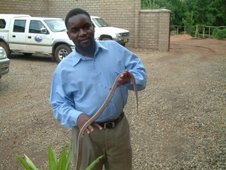
Chiefs’ educational visit to Thyolo Mountain
By Hastings Maloya
Forests and mountains in Malawi are now in a desperate situation. Forest destruction across the country continues at a wildfire pace, seemingly uncontrolled and ignored. Sadly, there is little concerted political or governmental response to this loss. Short-term gains of fuel-wood and charcoal availability are soon overshadowed by the complete deprivation of an extensive range of resources and services that our mountains traditionally offered. Bare hills stand stark testament to a tragic irresponsibility that we are all accountable for if we do not choose now to actively work together to counter and then reverse this process of destruction.
The Mulanje Mountain Forest Reserve is currently facing serious problems ranging from uncontrolled and illegal harvesting of forest resources, encroachment and annual bush fires. Deforestation is on an increase, a situation that would lead to serious problems if not checked. It is behind this observation that the Mulanje Mountain Conservation Trust (MMCT) through its Environmental Education, Awareness and Communications Programme organized and facilitated a two-day educational visit for chiefs from Mulanje and Phalombe to Thyolo Mountain. This trip was meant for the chiefs to appreciate the current sorry situation that Thyolo Mountain is in and for them to have a developmental interaction with their colleagues (chiefs) from Thyolo district.
Many people, just as the chiefs and local leaders, view the Mulanje Mountain Forest Reserve as solely a source of natural resources to benefit from; they rarely question the aftermath effects of overuse or abuse of such resources. It is therefore imperative that chiefs, as leaders and to a certain degree owners of the people and land, develop a genuine appreciation for the mountain and the reserve so that they can understand what implications their actions may have on it.
Malawi today has many other mountain forests that are in the process of disappearing entirely and silently. One example of such reserves that lost its resource glory is Thyolo Mountain, which not long ago was a beautiful forest reserve and today it is completely bare with no hope remaining in it. Mt Mulanje is in no way being spared as a victim in this national crisis. Production of charcoal and timber are the main threats. The trip by chiefs to Thyolo was therefore meant to open the chiefs’ eyes and call for action.
Summary
This was a two-day visit by chiefs from Mulanje and Phalombe to Thyolo. The trip was organised with close working relationship with the District Forest Officer and in co-operation with the District Forestry Officer for Thyolo. History, both written and oral, tells us that Thyolo Mountain once had a thick forest reserve and was among Malawi’s pride natural indigenous forest reserves. Over the years people started encroaching into the reserve by cutting down trees for various uses and also opening gardens for cultivation. This went on at uncontrolled pace to a point that the entire forest reserve was wiped out. Today, the mountain a bare land with farms established and buildings constructed in areas that are still a forest reserve.
On the agricultural front, people produce bananas from the forest reserve apart from other farm produces. This has mainly affected the water table and the dryness of most rivers that has/had their sources from Thyolo Mountain. One of the main rivers that supply water to the entire Thyolo urban community is Suwadzi, which is now drying up. There is a lot of sand that is now being produced by Suwadzi River, as a result of serious soil erosion that has taken place over the years.
It was imperative therefore to take the Mulanje Chiefs to Thyolo to see for themselves the situation that the mountain is in and have a feel of what would happen to the Mulanje Mountain Forest Reserve if the current destruction process is not checked. Again, Thyolo and Mulanje are close districts and share similar geographical features with similar challenges. Traditionally, the chiefs from the three districts (Mulanje, Thyolo and Phalombe) share similar cultural beliefs so it was good to bring them together.
A representative of the chiefs from Thyolo, who were 13 in number, Group Village Headman Maonga welcomed the colleagues from Mulanje and Phalombe and asked them to feel at home. He also thanked MMCT for facilitating the visit, which he said came at the most opportune time. He said this was a very important meeting not only for natural resource management but also to cement relationship between the districts. The chief reminded his colleagues that education is not only about being in class but that traveling from one place to another is a great eye opener.
During the visit, it was indeed noted that Thyolo Mountain once had a beautiful and thick forest reserve. The first leg of the tour took us into Mianga Tea Estates towards the mountain where the other side we saw the deforested part of the mountain and on the other side, there is the only remaining forest that is managed by the tea estate.
Looking at the only managed forest, the thicket of the trees, and the natural beauty it is giving against the other devastated area, it is a worrisome site on the damage thus caused by the careless use of natural resources. But it was also noted during the informal discussions that the tea estates can also be blamed on encroachment as it was noted that there was too much land with tea, maybe giving little land for cultivation for local people who might have resorted in encroaching into the reserve.
Chiefs from Thyolo explained that until around 1968 the Thyolo Forest Reserve was so thick that not a single person could dare enter it. They noted that it just started like a joke when people started cutting down trees for timber. At uncontrolled rate, it happened that with time, all the trees went and people started opening gardens and now constructing houses and different other buildings.
The biggest worry now is that Thyolo Mountain is no longer able to produce and give water to the people of Thyolo as it used to do. Meanwhile Thyolo is suffering with water shortages with the district headquarters mainly affected.
Ironically, the bare Thyolo Mountains is saving the nation with latest technologies. Towers for both cellular phones and FM radio stations stand tall on the mountain.
There are indeed challenges in managing forest reserves, in particular, matters concerning non-availability of management plans, encroachment, charcoal production, illegal harvesting of firewood, rampant corruption, shortage of financial and human resources, annual bush fires, poor maintenance of infrastructure, and now a dire need to involve local stakeholders. The idea of searching for a more effective way of doing things implies that we are aware of the deficiencies attending the present arrangement and that we wish to make improvements. We are all aware that we live in difficult times where environmental degradation in general is accelerating at unprecedented rates.







